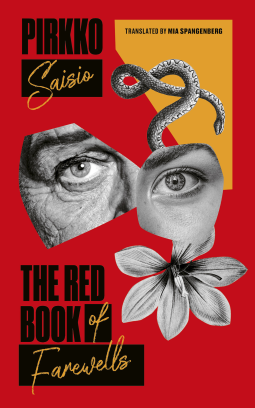
The Red Book of Farewells
by Pirkko Saisio
This title was previously available on NetGalley and is now archived.
Send NetGalley books directly to your Kindle or Kindle app
1
To read on a Kindle or Kindle app, please add kindle@netgalley.com as an approved email address to receive files in your Amazon account. Click here for step-by-step instructions.
2
Also find your Kindle email address within your Amazon account, and enter it here.
Pub Date Apr 25 2023 | Archive Date Apr 30 2023
Description
For fans of Tove Ditlevsen and Karl Ove Knausgaard, an enigmatic work of autofiction set in a time of leftist politics and criminalized sexuality.
Pirkko Saisio’s autofictional novel, in Mia Spangenberg’s tender translation, is a mesmerizing account of radical politics and sexual awakening in a series of farewells—to her mother, to the idealism of youth, to friends and lovers, and finally to her grown daughter. The novel embeds readers in a delirious Finland, where art and communist politics are hopelessly intertwined, and where queer love, still a crime, thrives in underground bars. But then one morning in 2002, on a remote island off the coast of Finland, the narrator Pirkko Saisio informs her publisher that she’s accidentally deleted her latest manuscript, The Red Book of Farewells. Playful and mysterious, The Red Book of Farewells is a work that stoically embraces the small revolutions of moving on.
Advance Praise
Winner of the Finlandia Prize
Winner of the Aleksis Kivi Prize
“A beautifully rendered portrait of a strikingly queer life—Saisio troubles any distinction we might try to draw between the personal and the political, the remembered and the invented.” —Morgan Thomas, author of Manywhere
“Pirkko Saisio might be the best Finnish author alive. She is wise, profound, funny, erudite, an old and precise person, and of course a divine storyteller and a master of dialogue. On top of all that, she uses the Finnish language masterfully.” —Aamulehti (Finland)
“Pirkko Saisio has for a long time been a genre of her own, an author with a recognizable style, but in her late works she has crossed borders and combined genres with ever more courage.” —Helsingin Sanomat
“The Red Book of Farewells is fundamentally about discovering artistic ambition and the origin of inspiration and, undoubtedly, about love, or loves. The red hue in the work is, after all, both the color of love and politics. Saisio’s style and self-irony are unfailing and keep me coming back to the book over and over again.” —Kirjavinkit (Finland)
“Saisio has had a major effect on the cultural atmosphere we live in.” —Aleksis Kivi Prize jury
“Self-awareness—and introspection, too, for that matter, are the means by which Saisio writes literature. The stronger the writer’s self comes across in the lines, the more rocky and wide open the text becomes. The illusion of control crumbles and Saisio’s impressive grasp of drama builds the dialogue, whose few words, yet precise rhythms, give rise to pocket-sized tragedies and comedies.”—Taina Ratia, Turun (Finland)
“Judging by this book, Pirkko Saisio deserves the praise, and one hopes for more translations of her work.…It is a satirical account on life in the working-class theatre school, a bittersweet love story, a political coming-of-age story in an era when homosexuality was still illegal in Finland, and a glimpse of life as a single mother—all of this is narrated in a chronological zigzag through the 70s. 80s, and in the 2000s. when the narrator is unsure whether to write ‘she’ or ‘I.’ Saisio is a kindred spirit to Jonas Gardell.” —Nina Lekander, Expressen (Sweden)
“A beautiful song about survival. Despite the sufferings, Finnish Pirkko Saisio dissects the hidden codes of relationships. Like no other, she manages to capture the waiting at the bar, when the person one is waiting for never shows up.” —Heidi von Born, Svenska Dagbladet
“Sleek, virtuosic.” —Maija Alftan, Helsingin (Finland)
Available Editions
| EDITION | Other Format |
| ISBN | 9781949641462 |
| PRICE | $24.95 (USD) |
| PAGES | 312 |
Available on NetGalley
Average rating from 8 members
Featured Reviews
 Elizabeth H, Reviewer
Elizabeth H, Reviewer
Some literature, like The Red Book of Farewells, echoes in the ears of its readers long after it has been written. Talk of its mastery of a particular element of the craft, its pioneering break from literary conventions, or its willingness to dive head first into a taboo conversation — perhaps one that had yet to be sparked — may be the perpetual buzz of these conversations.
This is to say, sometimes a work of art can hone one or maybe two elements of its craft so compellingly that this alone is enough to keep it relevant and breathing in the minds of its admirers for decades to come.
Pirkko Saisio’s translation of her soon-to-be-published book of autofiction, The Red Book of Farewells, is a remarkable patchwork of narratives and literary devices in which every element is not only expertly expressed, but is a key player, baking up something of its own class entirely.
If you’re looking for an easily categorized story in The Red Book of Farewells, you won’t find it here. There are not one or two shining literary devices carrying this book. Nor will you find a regurgitated narrative of a traditionally focused story arc.
What you will find are mingling and intimate reflections on criminalized love during an LGBTQ-intolerant time in Finland, expressions of leftist politics that helped decriminalize homosexuality, Saisio’s burgeoning path as an actress and playwright, and personal grapplings of identity, love, and loss.
In The Red Book of Farewells, readers weave in and out of different eras in Saisio’s life, disturbing a sense of linear time. All the while creating thought-provoking contrasts of Saisio’s sense of self, who and what she holds dear, and who or what she is ready to relinquish.
Though the genre of this book is autofiction, it could almost read as an epic narrative poem with Saisio’s intentional use of form, repetition, and attention to prose. A fine example of this is Saisio’s interior reflection on her second great love, Havva, whom she’s just beginning to notice,
“Havva is the chosen one, and she knows it. Havva is a dam that gathers all the lost and wildly flowing waters behind her, transforming them into a constructive force for the dictatorship of the working proletariat.
Havva is a bud on a tree that has the blood of the working people flowing through its trunk and branches that carry the fruit of the Soviet Union, The German Democratic Republic, Cuba, and all of their hardworking people.
Havva is a brick in a wall that will rise higher than any wall ever built by humankind before. That brick may be small and inconspicuous (certainly not!), but if someone makes the mistake of pulling it out, the entire wall would collapse.”
Saisio manipulates psychic distance with artful plays on first, second, and third-person narrative shifts throughout this book. In earlier recounts of her life, when being a lesbian was criminalized in Finland, the narrator mostly speaks of herself in the third person.
When the narrator is battling a dark depression after a devastating break-up that leaves her adjusting to single motherhood, she shifts to the second person. Sometimes, mostly when the narrator appears calm and confident, readers are taken into a first-person narration.
Other times, she utilizes third and first-person narrative. Saisio does this when she begins to notice the first woman she develops romantic feelings for, “She (I) vaguely noticed a girl with soft, pale skin who walked down the columned hallways of the university in a black velvet cape.”
To add to Saisio’s authority of blending a plethora of literary devices with equal amounts of precision and care, Saisio’s craft of world-building (and credit is certainly due to Saisio’s translator Mia Spangenberg here, too) deftly mirrors her interior experiences throughout this read,
“Bladder wrack sways in the depths. A small perch
frightened by my shadow zips under a rock to hide.
Honksu jumps onto the burning rocks in her bare feet.
“Watch out for snakes!”
That’s what you’re supposed to say when coming ashore
on an outer island.
Watch out for snakes.
Remember to watch out for snakes.
So… don’t forget the snakes.”
The stories comprising The Red Book of Farewells are many things. They are poetries. They are critical and personally intimate experiences of Finnish LGBTQ history. They are love stories.
They are stories of stepping in and out of one’s skin. They are stories of motherhood, daughterhood, personhood, and stories of the gains and unforgettable losses of one’s heart. They are multidimensional and oh-so-worthy of your full attention.
Pirkko Saisio’s The Red Book of Farewells, translated by Mia Spangenberg, will be published by the Center for the Art of Translation’s Two Line Press and will be available for purchase on April 25, 2023
Thank you, Two Lines Press, for allowing me to read The Red Book of Farewells early!
I am so happy this book got translated because I probably would have never had the chance to read this masterful novel otherwise. It captured my heart.
This book was an insightful and fantastic literary work of art. The author tells the story of their life and analyzes the many different relationships they were part of in such a magnificent way that I found myself enthralled by the entire novel. This book is filled with a wide variety of emotions and unique perspectives that cannot be found in most American novels. I thoroughly enjoyed reading this book and I am very glad it could be translated.
Thank you Netgalley and Two Lines Press for this ARC in exchange for an honest review.
Readers who liked this book also liked:
We Are Bookish
Literary Fiction, Multicultural Interest, Women's Fiction
Silvia Moreno-Garcia
Historical Fiction, Literary Fiction, Sci Fi & Fantasy
We Are Bookish
Mystery & Thrillers, OwnVoices, Teens & YA
We Are Bookish
Biographies & Memoirs, Nonfiction (Adult), Parenting, Families, Relationships
Rachel Joyce
Historical Fiction, Literary Fiction, Women's Fiction


















